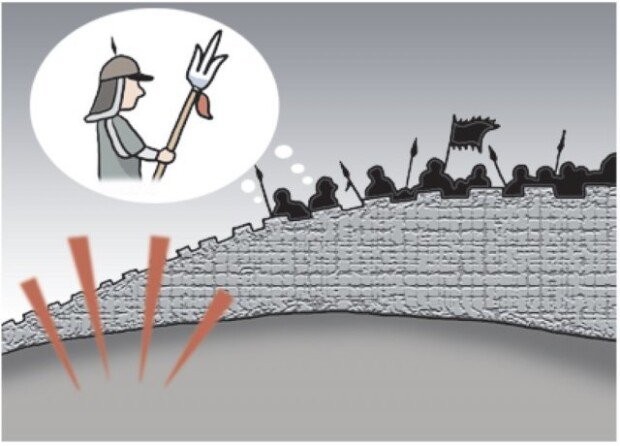A commander who failed to maintain vigilance
A commander who failed to maintain vigilance
Posted February. 23, 2021 07:34,
Updated February. 23, 2021 07:34

The commander, who took charge of guarding the Uiju Castle during the Later Jin invasion of Joseon in 1627, was Adm. Yi Sun-sin’s nephew Yi Wan. He was a man of great responsibility and courage, who had rich experience in battles because he fought against Japanese during Japanese invasion of Korea in 1592 and had the command technique of Yi Sun-sin.
The royal court of Joseon highly appreciated Yi Wan’s ability and insisted that he should be the one guarding the Uiju Castle. The special forces of the Later Jin, however, infiltrated into the Castle through the floodgate on the first day of the invasion. The Uiju Castle was captured easily and Yi Wan died in a street battle. Some people pitied Yi but he was blamed for failing to remain vigilant.
In Ssangnyeong Battle, one of the worst defeats in the Second Manchu invasion of Joseon, the Joseon soldiers did not know the enemy was coming because they were negligent in reconnaissance and vigilance. During the Mongol invasions of Goryeo, the Goryeo soldiers were defeated in a surprise attack because they were taking a rest at Dongseonyeong near Jeongbangsanseong Fortress in Hwanghae Province, not knowing the Mongolian army was approaching.
History tells us that failing to set up guards and scouts invites ambush and eventually leads to a crushing defeat. King Seonjo lamented at the news of such defeats during the Japanese invasion of Korea in 1592. Could it be possible that the commanders of the Joseon army were so foolish that they did not even set up guards? Maybe in a few cases. But the words of those, who were not at the scene, may not be true. Maybe they did not know the effective ways of setting up guards, not that they did not know how to set up guards. The real cause behind such defeats must have been the lack of training and systems. These problems were also pointed out by the late Gen. Paik Sun-yup, a war hero of the Korean War.
Punishing the commander does not solve the problem in these cases. Recently, cases of lax vigilance have occurred at the demarcation line. We cannot be perfect every time but the cause of imperfection must be thoroughly checked and improved. There is a saying, “A commander who failed to maintain vigilance is unforgivable.” We may not even get a chance to forgive them if we are at war.
Headline News
- Israel prepares for retaliation against Iran
- Samsung reclaims top spot, surpassing Apple in smartphone market
- 77% of Koreans in 20s and 30s are 'Kangaroo Tribe' due to job crisis
- KBO referees embroiled in controversy over ABS decision concealment
- Inflation, oil price surge put double shock on global economy







